
Resolving Intergenerational Conflicts
An Approach from Philosophy, Economics, and Experiments
Versandkostenfrei!
Versandfertig in 6-10 Tagen
98,99 €
inkl. MwSt.
Weitere Ausgaben:

PAYBACK Punkte
49 °P sammeln!
This book is an unprecedented consideration of the challenges of what we can do for generations yet to come. Many growing intergenerational conflicts of interest, such as climate change and fiscal sustainability, are the result of the historically new progress of increasing human power, and the resolution of those conflicts demands a new intergenerational ethic. The book offers fresh new ideas for resolving intergenerational conflicts through the exploration of an entirely new field, conceptualized in philosophy, developed in economics, and tested in experiments. In particular, this work devel...
This book is an unprecedented consideration of the challenges of what we can do for generations yet to come. Many growing intergenerational conflicts of interest, such as climate change and fiscal sustainability, are the result of the historically new progress of increasing human power, and the resolution of those conflicts demands a new intergenerational ethic. The book offers fresh new ideas for resolving intergenerational conflicts through the exploration of an entirely new field, conceptualized in philosophy, developed in economics, and tested in experiments. In particular, this work develops the theory of intergenerational cooperation based on a new relationship of direct reciprocity between generations. From experimental results, the possibility of intergenerational cooperation through Kantian categorical imperative is shown. The book also examines the effectiveness of inviting representatives of future generations, which are called "imaginary future generations", into the deliberations for current policy decisions.
The original Japanese edition of this book was awarded the 66th Nikkei Prize for Excellent Books in Economic Science. The prize was established in 1958 to contribute to the advancement of academics and knowledge in the fields of economics, management, and accounting, as well as to its general dissemination and application.
The original Japanese edition of this book was awarded the 66th Nikkei Prize for Excellent Books in Economic Science. The prize was established in 1958 to contribute to the advancement of academics and knowledge in the fields of economics, management, and accounting, as well as to its general dissemination and application.












